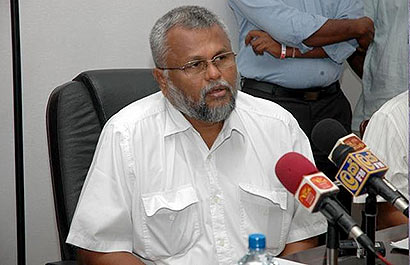Douglas Devananda to stand trial for Chennai murder

Former Sri Lankan minister Douglas Devananda is set to stand trial, through video conferencing, before a Chennai court in a 28-year-old murder case.
As all 10 accused in connection with the Diwali- eve murder in 1986 are absconding with non-bailable warrant (NBW) pending against them, the prosecution has sought to split the trial and hold a separate trial against Devananda. Others will face trial as and when they are nabbed.
In 1987 Devananda and nine other Sri Lankan Tamils were allegedly involved in a shootout at Choolaimedu in Chennai in which a resident of the locality was killed.
Though all the suspects were arrested, they absconded after being released on bail.
An NBW was issued against Devananda, who later became a minister in the Mahinda Rajapakse government in Sri Lanka.
At the end of civil war in 2009, he was part of a diplomatic delegation that visited India in June 2010. TOI exposed the fact that he was an absconding accused with an NBW against him during this visit. But his diplomatic immunity ensured he was not arrested.
Devananda could not return to India since then. He later moved the Madras high court for cancellation of the NBW and denied that he was an absconding accused. It was at the end of a second round of litigation on September 10, 2014 that he obtained an order from Justice C T Selvam permitting him to stand trial through video conferencing.
On Tuesday, additional city public prosecutor M Prabhavathi filed a petition before the IV additional sessions judge M Santhi seeking to split the case and conduct trial.
In his order last year, Justice Selvam had said Devananda should appear through video conferencing from the office of high commissioner of India in Colombo, as and when required.
The judge said: “This order is passed in the peculiar circumstances of the case given the diplomatic status and the effect execution of a non-bailable warrant issued against a minister of the neighbouring state may entail. This order shall not be seen as a precedent,” Times of India reports.
Latest Headlines in Sri Lanka
- Sri Lanka moves to strengthen fight against money laundering and terror financing February 3, 2026
- L.S.P. Jayaratne approved as Auditor General by Constitutional Council February 3, 2026
- Defence Secretary inspects Colombo Central Bus Terminal renovation February 3, 2026
- Popular actor Hemal Ranasinghe arrested February 3, 2026
- MILCO shows state institutions can be rebuilt by ending corruption: PM February 3, 2026


